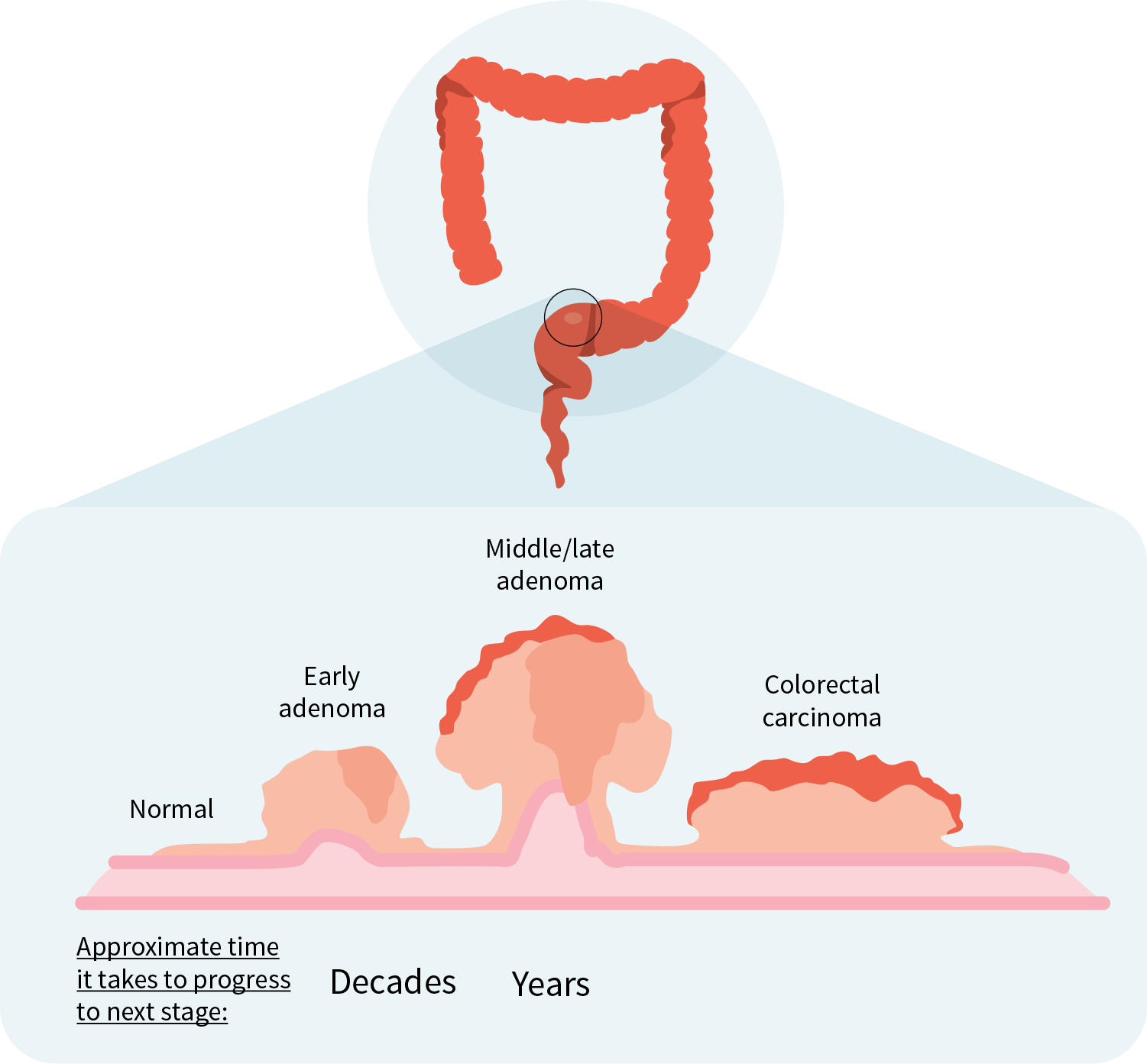Summary
Behind lung cancer, colorectal cancer[1] is the most common cause of cancer death and the fourth most common cancer after lung, breast, and prostate cancer. There were around 1.8 million cases of colorectal cancer worldwide in 2018, resulting in close to 900,000 deaths. Most colorectal cancer cases develop from benign tumors (adenoma) that undergo genetic changes[2] over time (at least 10 years) to ultimately become cancerous (carcinoma). This process, often called the adenoma-carcinoma sequence, is depicted in Figure 1.
Figure 1: The adenoma-carcinoma sequence
 Reference: Nguyen et al. Oncol Lett 2018 Jul.[3]
Reference: Nguyen et al. Oncol Lett 2018 Jul.[3]
Early detection[4] through colonoscopy screenings is associated with reduced risk of recurrent colorectal cancer and death, and removal of colorectal adenomas appear to reduce the risk of colorectal cancer mortality[5] and incidence[6]. However, recurrence is common[7].
Examine Database: Colorectal Cancer Risk
| Intervention | Grade | Effect | Detail |
|---|---|---|---|
| Vitamin E | D | ||
| Curcumin | B | ||
| Folic Acid (Vitamin B9) | D | ||
| Panax Ginseng (Korean Ginseng) | |||
| Ginger | |||
| Vitamin D | |||
| Reishi |
Research FeedRead all studies
In this meta-analysis of 9 case-control studies in adults from Iran and Turkey, higher intakes of phytochemical-rich foods were associated with a 60% lower odds of cancer, compared to lower intakes.
References
Examine Database References
- Curcumin - He ZY, Shi CB, Wen H, Li FL, Wang BL, Wang JUpregulation of p53 expression in patients with colorectal cancer by administration of curcuminCancer Invest.(2011 Mar)
- Reishi - Oka S, Tanaka S, Yoshida S, Hiyama T, Ueno Y, Ito M, Kitadai Y, Yoshihara M, Chayama KA water-soluble extract from culture medium of Ganoderma lucidum mycelia suppresses the development of colorectal adenomasHiroshima J Med Sci.(2010 Mar)
- Vitamin E - Lonn E, Bosch J, Yusuf S, Sheridan P, Pogue J, Arnold JM, Ross C, Arnold A, Sleight P, Probstfield J, Dagenais GR, HOPE and HOPE-TOO Trial InvestigatorsEffects of long-term vitamin E supplementation on cardiovascular events and cancer: a randomized controlled trialJAMA.(2005 Mar 16)
- Vitamin E - Lee IM, Cook NR, Gaziano JM, Gordon D, Ridker PM, Manson JE, Hennekens CH, Buring JEVitamin E in the primary prevention of cardiovascular disease and cancer: the Women's Health Study: a randomized controlled trialJAMA.(2005 Jul 6)
- Vitamin D - Gorham ED, Garland CF, Garland FC, Grant WB, Mohr SB, Lipkin M, Newmark HL, Giovannucci E, Wei M, Holick MFOptimal vitamin D status for colorectal cancer prevention: a quantitative meta analysisAm J Prev Med.(2007 Mar)
- Ginger - Zick SM, Turgeon DK, Vareed SK, Ruffin MT, Litzinger AJ, Wright BD, Alrawi S, Normolle DP, Djuric Z, Brenner DEPhase II study of the effects of ginger root extract on eicosanoids in colon mucosa in people at normal risk for colorectal cancerCancer Prev Res (Phila).(2011 Nov)
- Curcumin - Robert E Carroll, Richard V Benya, Danielle Kim Turgeon, Shaiju Vareed, Malloree Neuman, Luz Rodriguez, Madhuri Kakarala, Philip M Carpenter, Christine McLaren, Frank L Meyskens Jr, Dean E BrennerPhase IIa clinical trial of curcumin for the prevention of colorectal neoplasiaCancer Prev Res (Phila).(2011 Mar)
- Vitamin E - Buring JEAspirin prevents stroke but not MI in women; vitamin E has no effect on CV disease or cancerCleve Clin J Med.(2006 Sep)
- Panax Ginseng (Korean Ginseng) - Yun TK, Choi SYPreventive effect of ginseng intake against various human cancers: a case-control study on 1987 pairsCancer Epidemiol Biomarkers Prev.(1995 Jun)
- Folic Acid (Vitamin B9) - Vollset SE, Clarke R, Lewington S, Ebbing M, Halsey J, Lonn E, Armitage J, Manson JE, Hankey GJ, Spence JD, Galan P, Bønaa KH, Jamison R, Gaziano JM, Guarino P, Baron JA, Logan RF, Giovannucci EL, den Heijer M, Ueland PM, Bennett D, Collins R, Peto R, B-Vitamin Treatment Trialists' CollaborationEffects of folic acid supplementation on overall and site-specific cancer incidence during the randomised trials: meta-analyses of data on 50,000 individualsLancet.(2013 Mar 23)
- Folic Acid (Vitamin B9) - Moazzen S, Dolatkhah R, Tabrizi JS, Shaarbafi J, Alizadeh BZ, de Bock GH, Dastgiri SFolic acid intake and folate status and colorectal cancer risk: A systematic review and meta-analysis.Clin Nutr.(2018-Dec)
- Vitamin E - Xin J, Jiang X, Ben S, Yuan Q, Su L, Zhang Z, Christiani DC, Du M, Wang MAssociation between circulating vitamin E and ten common cancers: evidence from large-scale Mendelian randomization analysis and a longitudinal cohort study.BMC Med.(2022 May 11)


